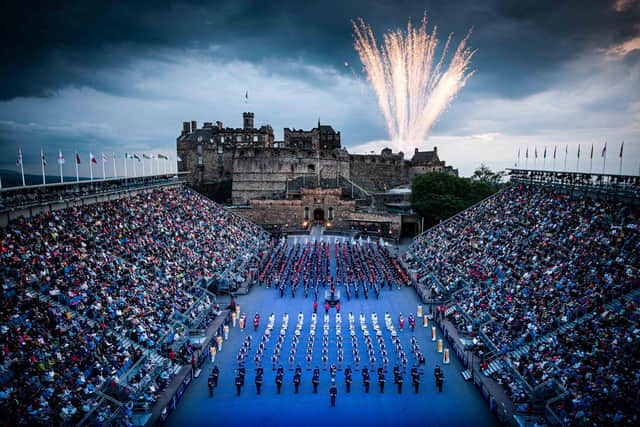Royal Edinburgh Military Tattoo chief blames Government insurance impasse for cancellation
and live on Freeview channel 276
Major General Buster Howes has revealed he would have been pressing ahead with plans to stage this year’s show if ministers had agreed to underwrite the costs of the event having to be called off at the eleventh hour.
Major General Howes said the Scottish Government was prepared to relax social distancing rules on Edinburgh Castle esplanade and allow 4800 spectators at each performance if other mitigation measures were in place and the city was not back in lockdown.
Advertisement
Hide AdAdvertisement
Hide AdHe revealed that a 480-strong cast was being assembled to stage the revival of the Tattoo, which was first staged in 1950, but was called off for the first time in its history in the face of the pandemic in 2020.
He suggested that the decision to cancel was prompted by an announcement from UK Culture Secretary Oliver Dowden last week that the Government would not decided whether to help underwrite cancellation costs until social distancing was lifted in England.
Prime Minister Boris Johnson has also cast doubt in recent days about whether this would be able to ahead as planned on 21 June.
An official announcement about the cancellation of the Tattoo said it was facing too many financial risks.
Advertisement
Hide AdAdvertisement
Hide AdMajor General Howes said the Tattoo had been given “gateway” status by the Scottish Government several weeks ago to help it try to plan ahead. It had also agreed to relaxed distancing rules to ensure that European Championship football matches can go ahead in Glasgow next month.


Major General Howes added: “We had worked our way through considerable challenges and around a week ago submitted an 88-page document to the Scottish Government covering all the detail of how we were going to do the event safely.
"The Scottish Government had shown great flexibility and a real desire to make the show happen. The rigour of all the measures we were taking to defer risk meant they were prepared to go to less than two metres.
"We were due to go through all the clinical scrutiny, but postponed it. I’m not saying that they would have ultimately signed it off, but all the auguries were positive.
Advertisement
Hide AdAdvertisement
Hide Ad"Both ourselves and Festivals Edinburgh have made no secret of the fact that insurance was an important issue, encouraged in part by the fact that right at the start of the pandemic the Chancellor had agreed to subsidise a scheme for Britain’s film industry.


“We have been having dialogue with the DCMS and anyone else who would listen.
"Oliver Dowden went on record on Thursday to say the Government was keeping the insurance issue under review. His position is that the Government will get to 21 June and then have a big think about it. For us, that was just too late.
"We were just on the cusp of having to make serious financial commitments just to make the thing happen. Spending more than £2m to build a structure like an oil rig on a grade-A listed monument is not a trivial undertaking. The UK Government just couldn’t give us the assurance in the timeframe we needed.”
A message from the Editor:
Thank you for reading this article. We're more reliant on your support than ever as the shift in consumer habits brought about by coronavirus impacts our advertisers.
If you haven't already, please consider supporting our trusted, fact-checked journalism by taking out a digital subscription.
Neil McIntosh
Editor
Comment Guidelines
National World encourages reader discussion on our stories. User feedback, insights and back-and-forth exchanges add a rich layer of context to reporting. Please review our Community Guidelines before commenting.